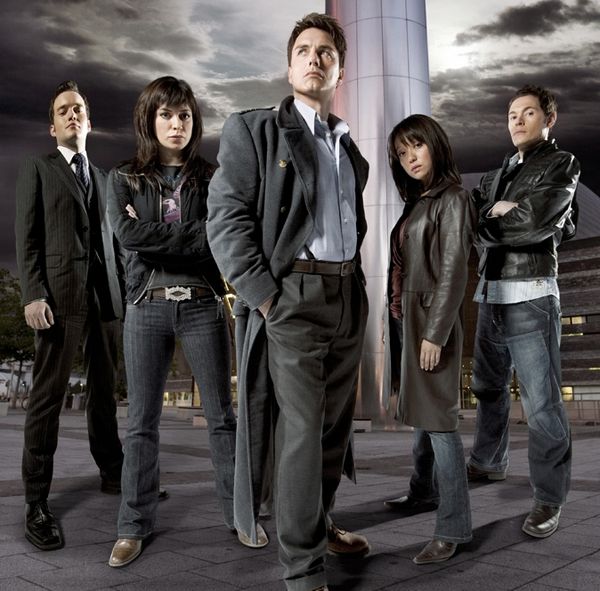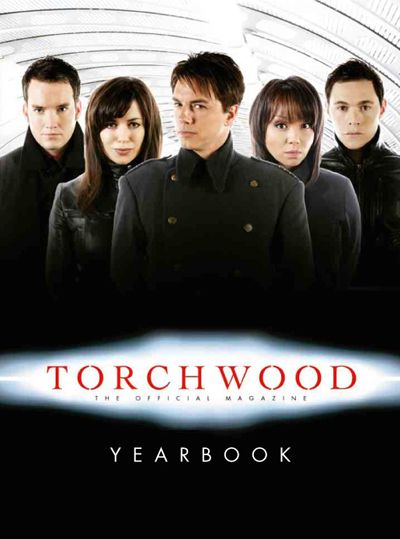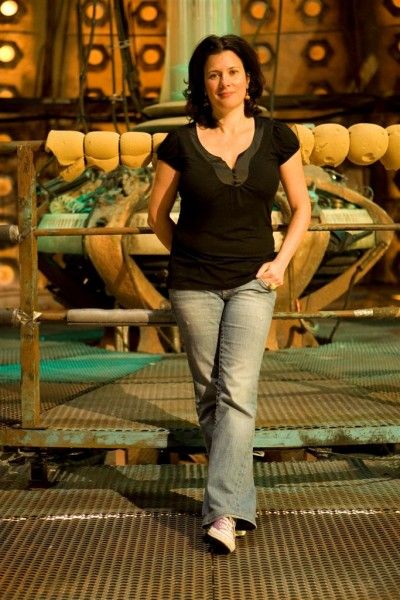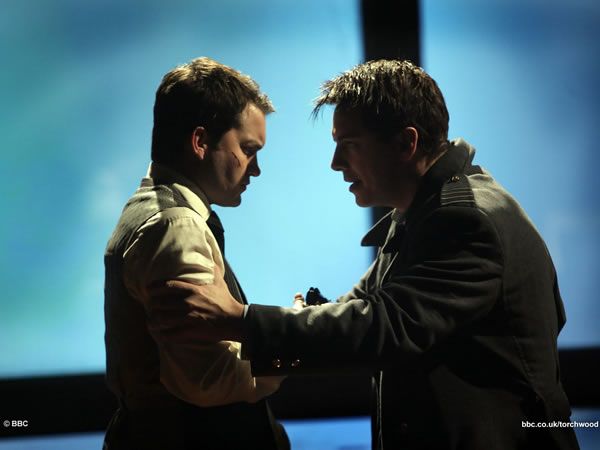In 2003, highly-regarded UK television writer Russell T. Davies and his producing partner Julie Gardner reinvented Doctor Who for a new audience. This regeneration of the sci-fi series led to huge ratings success and the creation of two new series, The Sarah Jane Adventures and Torchwood, which is now in development for its fourth season, and its first on the pay cable channel Starz.
In this exclusive interview with Collider, executive producer/creator/show runner Russell T. Davies and executive producer Julie Gardner talked about their new partnership with Starz, giving the much-beloved series a more global feel, and how science fiction is the perfect means with which to examine the human race. They also hinted at some story ideas and new characters for Season 4, discussed the strength of their new writing staff and revealed that they hope to take the show to the San Diego Comic-Con for 2011. Check out what they had to say after the jump:
The events of Season 3's five-part mini-series Torchwood: Children of Earth, where the team faced their fiercest threat to date, resulted in the survival of only two of its members – former Police Officer Gwen Cooper (Eve Myles), who has since disappeared with her husband and child, and the mysterious Captain Jack Harkness (John Barrowman), whose history spans across the centuries. When Season 4 returns in the Summer of 2011, it will have a bigger, more international feel, as C.I.A. agent Rex Matheson is investigating a global conspiracy that will challenge the entire human race. When he discovers that the answers seem to lie within the secret Torchwood institute, he comes under attack in both the U.S. and U.K. and realizes that there are forces at work within every level of society that are determined to stop Torchwood’s return.
Here's what they had to say:
Question: How did this collaboration with Starz come about for Season 4? Why now?
RUSSELL T. DAVIES: Well, Torchwood is a show that’s always stayed lively on its feet and always expanded, and this is just about as far as it can expand now. It’s a brand new audience and a brand new continent.
JULIE GARDNER: We moved out to L.A. a year ago, with BBC Worldwide Productions, so we were here just when the viewing figures were coming in from the U.K. for Children of Earth, and we were really excited by the reception that the title was getting. Russell had one particular story in mind, which we can’t talk about, that he was burning to tell, and it fit in incredibly well, within the framework of what Torchwood was going to be for Season 4. It just felt right, with us being in L.A. and since Children of Earth was straining to be more global. There were American characters in there and there was a big society throughout. It was a natural extension of everything we’ve done with the title.
What do you feel Starz will bring to Torchwood that fans of the show haven’t yet been able to see?
DAVIES: There’s a great ambition behind Starz to have contemporary pieces that are saying a lot about the world. As a drama, Torchwood is very ambitious. Starz is not after plain, domestic pieces, and we’d already started to do that with Children of Earth. That had a lot to say about society, and that’s what Starz latched on to. In terms of what we can do that’s new is that we can tell stuff on an international basis and have great American stories. A lot of it is going to be set in America and it’s going to have an examination of America, an ambition that’s American and a thrust that goes with this nation that’s very exciting and truly contemporary. Let’s be honest, certainly in the West, America is the dominant culture. It sends shockwaves across the whole of Europe. It’s a really interesting place to take the story, once you see what the story is. We’re coming to the story’s heartland by bringing it here. Starz offers an enormous stage, and the confidence and freedom to tell the story that we want.
Will it change the look and feel of the show at all, or will fans of the show still recognize what they loved?
GARDNER: They’ll completely recognize it, but we’re building on the work that we’ve done before. When you look at it season by season, the show moved from channel to channel every year. It’s always reinvented itself and always stayed lively on its feet. You can still recognize it. Even though from Season 1 to where we are now is a very, very different show, there’s a flavor there that is very consistent.
What can you say about Season 4 and where you’re going to take the series?
DAVIES: It’s just heartfelt, really. What I mean by that is that the central issue goes to the heart of every one of us and every family. The questions it asks will cut right beneath your everyday life of work, sleep, food and family, and goes right to the heart of who we are and why we’re here. I think we’ll challenge you and disturb you. It’s the intensity of that ambition that’s the most fascinating thing. That sounds really vague, but the moment you know the initial core concept, everything I’m saying will make sense and start to click into place in your brain. You’ll say, “Oh, right, I see where this is heading.” The questions never really stop. That’s the fun of it. A whole 10 hours is a long time for a story to roll, but there’s that much power behind it. It’s self-generating, really. It’s very exciting. It’s a proper, intelligent examination of some very big issues.
Are you going to do anything to allow for the fact that you could have people tuning in now, who haven’t ever seen the show before?
DAVIES: Absolutely! I’ve done it before. Children of Earth moved channels in Britain, so that was a new introduction for a whole primetime audience. And, I actually got experience doing that with Doctor Who, which I brought back after 16 years, for a new audience. I’m the perfect person to do it, really. I’m used to relaunching things and keeping the audience from the past, but always looking for a new audience. Every show should always do that. Every new season of a show should go out there and look for a new audience because all people should be watching.
Have you figured out how you’re going to do that?
DAVIES: The first episode was written last October, and that is the episode that Starz read and bought, so it very clearly didn’t push them away. We went into the meeting with Starz with them knowing nothing about the history and mythology of Torchwood, and it did not push them away. They came to it as new viewers, new readers and new producers, and leapt on board straight away. We’re delighted. It’s going to work, I promise.
What do you think it is about Captain Jack Harkness, and John Barrowman as an actor, that makes people want to follow him from season to season and network to network?
GARDNER: He’s just so charming. He’s fun and he’s got such a glint in his eye. He’s a proper swash-buckling hero.
DAVIES: He is an unusual mix of being matinee idol handsome and, at the same time, very modern. He’s an openly gay man, playing an openly omni-sexual character. You can’t say that of many shows, and he does that with such a glint in his eye, and so much cheek and charm.
GARDNER: There’s so much relish to him.
DAVIES: He does the role with so much joy that prejudice can’t even enter the room for a second. It’s just glorious.
How international will the story be this season? Will a lot of it be in America?
GARDNER: Yes, a lot will be. We have some U.K. settings and stories, and then a lot of it moves to America. That’s what we mean by international. There’s a big global threat at the heart of it, and we see the implications play out in those two countries, predominantly.
Are you going to be very specific to the locations you’re using in the States?
DAVIES: I hope so. The ambition is to shoot in Los Angeles, but that is yet to be confirmed. Any place can double up as a number of places. There will be scenes set in Washington, certainly, but we won’t go to Washington to shoot. No one does that anymore. But, we have a very experienced production and design team, so we’ll be able to do that. It’s exciting.
Often on this show, the humans are much more monstrous than the monsters are. Will that continue this season?
DAVIES: That’s very true! Yes, I think the show works very well as an examination of the human race because there’s not really many other races we can examine. So, yeah, it is about us. I think all great science fiction comes down to that, in the end. The best metaphors in Buffy came down to, “What’s it like to be in high school, as a kid?” It’s the same with Torchwood: The New World. It’s about us and our decisions and our lives, and how we live with each other and how we die with each other. That forms the core of the story.
With Captain Jack left in such a dark place at the end of Children of Earth, how much will that affect him now? Has he recovered from what he went through?
DAVIES: Yeah. He’s a man who’s lived for thousands of years, and he’s seen the beginning and the end of the universe. We will deal with it properly, sensibly and intelligently, but at the same time, the most important thing is to move on, as you would want for any of your friends. If your friend had suffered through a terrible time, you don’t want to be the friend who sits there and says, “Tell us about your terrible time, all over again.” Move on, look up, start a new relationship, and look towards the horizon and the dawn. There will be a lot of that with Jack as well.
How much time will have passed?
DAVIES: Torchwood will have been off-air for two years, so I think it will feel like two years have passed. The script isn’t that specific about it, but I think that two-year gap feels right.
How are the events of Season 3 affecting the writing of Season 4? Does it feel like you have a new canvas to write on?
DAVIES: It does. Children of Earth left things almost formatless. They had no base, no authority and no mission, a lot of the time, except to survive. I thought that was very successful, and that is very much the template of the new Torchwood. They’re not working for the government. They’re not working for the police. They’re very much underground and trying to survive. They’ve taken extreme actions. They have friends, they have enemies and they have betrayals. I love that. What you saw in Children of Earth is the format now.
Do you know what sort of additions you’re looking to make to the cast?
DAVIES: We’ve got one script and very concrete storylines, so we know there are new regulars, new occasional guest stars and relatives of those characters. It’s all laid out, but we’re keeping it a secret. We’re keeping it close to our chests.
Being such a fan favorite for so many people, do you have any plans to ever bring James Marsters back to the show?
DAVIES: We love him! It could happen, but I’d have to say it’s not going to happen. I don’t want to raise any false hopes of people expecting that lovely man back on our screen. He’s so in-demand, he’ll be back in someone’s screen, any day now. He’s simply not in this story, but we love him.
GARDNER: He’s fantastic.
DAVIES: The fact that he’s willing to come back is just a huge compliment because the man is gorgeous.
GARDNER: In every way.
Can you talk about the writing staff that you’ve put together for this?
GARDNER: It’s exciting. It’s a good staff.
DAVIES: They’re just about the top names in the industry.
GARDNER: We started with Jane Espenson. We have such a shared viewership with Jane. We love all the work that she’s done, and she’s watched Torchwood in previous years. Then, we were able to get Doris Egan, who we loved from Smallville and House. I was working with John Shiban over here already. I’m a big fan of Breaking Bad and all his work on The X-Files. And, we invited John Fay back, who had done such good work for us on Children of Earth. There’s a mix of British writers and American writers for the next season.
How are you splitting up the writing?
DAVIES: The episodes are divvied up. I wrote the first episode. That’s all I can definitely say.
Do you plan out the over-arcing story, and then the staff splits up the individual episodes?
GARDNER: Yes. We spent four weeks with them, working through all of the stories. The way the episodes divide up is that you can see writers’ interests in particular characters or moments, so it’s very organic.
What are the advantages that the mini-series format gives you, in telling an ongoing story, as opposed to doing individual episodes?
DAVIES: I love it. I simply prefer it. The monster-of-the-week stories were brilliant, in their day, in Torchwood, but having discovered this new format, I think it’s more ambitious and intelligent. It allows you to stop and take pause and look at the world. Those ambitions are admirable. While I’m on the show, that will never stop. While the show keeps running, we’ll never go back to the week-to-week stories.
Does that help keep things more fresh for you?
DAVIES: Yes, it does, that’s true. When I was working on Doctor Who, it was always one-off stories every week and I wanted to do something different, so I started working on The Sarah Jane Adventures, which is the children’s spin-off of Doctor Who, and that’s one-off stories. I want different things on my plate and on my palate.
Are you going to take Torchwood: The New World to San Diego Comic-Con in 2011?
DAVIES: I would think so. We can’t promise anything, but yes.
GARDNER: We love going to Comic-Con, so we’d love to go.
What do you get from that kind of feedback?
DAVIES: It’s like nothing else in the world. It’s an enormous buzz.
GARDNER: It’s just fun. And, there’s such love of the titles. It’s lovely to be there.
DAVIES: They’re like us. We love these shows. They’re fellow geeks. That’s the brilliant thing. It’s a celebration of it. It’s fantastic.




